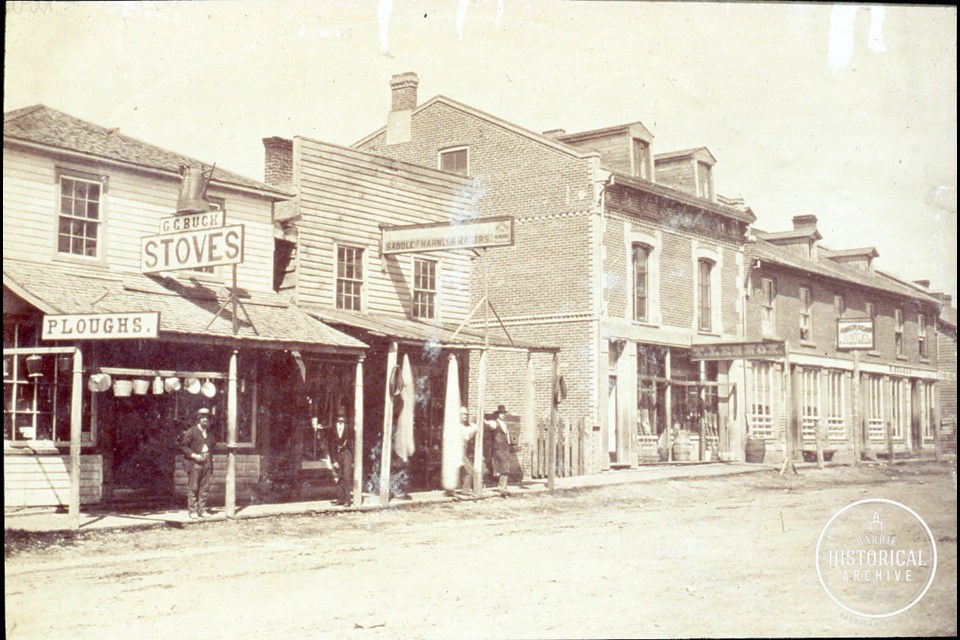Election time in Barrie has never been a dull affair. From as far back as our village days, political affiliations have been clearly defined, robustly contested and openly promoted by newspapers that unashamedly favoured one party over the other.
The Conservatives, Reformers and the Liberals each tried to shout louder than their opponents to be heard by their voting constituents, all of whom were males over the age of 21, owned or rented property of a value over $200, were good British subjects and were not “Indians”.
These eligible voters were very valuable to the candidates. They were treated to swanky parties with food and drink, cash gifts and promises of good positions for their support. Of course, there was a catch. Before 1874, there was no secret ballot. Voters had to make their choice orally and in front of everyone.
To be a candidate and stand for election in those days was no picnic though. You were expected to be a morally incorruptible pillar, dedicated to your party, a great and convincing orator and well experienced in business or law, or both. You also needed a very thick skin.
No blow was considered too low by the opposition. Biased local newspapers promoted their man largely by tearing down his opponents by innuendo, thinly veiled rumours or outright attack.
In 1871, Barrie, a small market town that had emerged from the woods only a few decades previously, had already formed a core group of citizens who might today be called “old Barrie” folks. Their prominent names, like Ardagh, McConkey, Lount and Gowan, are still familiar to us today, and there was little room for upstart outsiders.
That spring, a provincial election was called. Two well-known Barrie elites threw their hats immediately into the ring. Mr. William Lount, a prominent lawyer, was already distinguished for being the representative for Barrie in the first Parliament of Ontario since the time of Confederation. Mr. W.D. Ardagh was also a legal man of great local fame and was at the time County Warden. What hadn’t been counted on was the entry into the race of a complete unknown, Hermon Henry ‘H.H.’ Cook.
Cook was a lumber man, in fact one of the biggest Canada had ever seen at that time. The fifth son of a Loyalist family out of Dundas County, he was shrewd in business and not unfamiliar with politics as two of his brothers were at times M.P.P.s in their home county. Cook had been watching the northerly progress of the railway and decided to gamble that it would sooner or later reach Georgian Bay around the site of present day Midland. He bought up large pieces of land and built an enormous saw mill nearby. H.H. Cook quickly became extremely successful, and with his finances all but secured, he turned his attention to the other Cook family passion – politics.
The lumber baron was immediately unwelcome.
“As for Mr. Cook, he is to us, so far as political matters are concerned, an entire stranger. What means has he hitherto employed for the promotion of our welfare?”
The Northern Advance, squarely in Ardagh’s corner, objected to Cook’s so-called non-residency. His timber business dealings took him from Midland to Toronto, and to Montreal and farther, but rarely to Barrie. The writers wondered in print how Mr. Cook was going to address the needs of the farmers, who were at the centre of Barrie trade, if he was constantly on the road.
In reality, H.H. Cook was not considered much of a threat. Most of the time, both the Northern Advance and the Barrie Examiner took jabs at him that looked to point out his non-Barrie residency, highlight his political inexperience and perhaps paint him as less than intelligent.
In the March 16th edition of the Northern Advance, the writers take pokes at his ancestry by referring to his “consanguineous elders” and by tossing in the words “sauerkraut and Shiedam schnapps” in an attempt to remind voters that Cook had a German mother.
In that same edition, voters read that H.H. Cook’s education was “fragmentary and disjointed” and that “Mr. Cook can talk horse, timber, or cards with anyone in that line of business but where any solid, sensible subject is to be discussed, Mr. Cook is found to be deplorably lacking.”
H.H. Cook did lose the race that year, but did not come in third place, but surprisingly landed in second place. W.D. Ardagh won the seat for the riding in the second Parliament while the incumbent, William Lount, came in last.
Each week, the Barrie Historical Archive provides BarrieToday readers with a glimpse of the city’s past. This unique column features photos and stories from years gone by and is sure to appeal to the historian in each of us.



